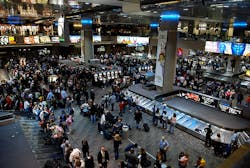International Transport Forum: Airport Updates Help Economies Soar
The International Transport Forum of 54 countries endorsed airport and road construction Thursday as "the backbone of national economies," even as the United States struggles to improve and expand its airports.
Ministers from the nations, which include the U.S. and much of Europe and Asia, issued a statement saying transportation construction "provides connections for people and goods, access to jobs and services, and enabling trade and economic growth." The statement came here at the forum's annual summit of government and industry leaders.
But José Viegas, the forum's secretary-general, said people think of transportation projects as "manna from heaven" that comes without additional taxes. As government spending has shifted to health care and other priorities, he said, transportation increasingly relies on user fees.
"We are going down a dangerous path of under-investment, which would mean degradation of conditions and ultimately safety risk," Viegas said.
Angel Gurria, secretary-general of the Organisation for Economic Co-operation and Development, an international group that promotes economic and social programs, said nations tend to postpone major construction projects such as airports when government finances are tight. But he said investing in airports is crucial because they are indispensable for the economy.
"I don't think it's a question of whether, but how," Gurria said of construction funding. "Austerity against growth is a false dilemma."
Sani Sener, CEO of TAV Airports, including one in Istanbul, said travelers want easy access to airports, short lines and nice lounges. But he said an executive at a low-cost airline joked that they just need a runway and a tent.
Istanbul's airport expanded from 10 million passengers a year in 2000 to 45 million now, he said. Airlines and airports, he added, must cooperate, as funding choices for airport construction are government-regulated landing fees or passenger boarding fees.
"It is a complex business," Sener said. "Because of these investments, airlines and airports must sit together."
Airport construction in the USA long has been a thorny subject.
The April compromise between Congress and the Obama administration to end air traffic-control furloughs allowed the Federal Aviation Administration to shift up to $253 million from an airport construction-grant program to pay for personnel.
President Obama noted April 30 that the United States has none of the top 25 airports worldwide, which the Britain-based consultancy Skytrax ranked from customer-satisfaction surveys. Cincinnati ranks 30th.
"Essentially ... we've said, in order to avoid delays this summer, we're going to ensure delays for the next two or three decades," Obama said.
His proposed budget would cut $450 million from airport construction grants, leaving $2.9 billion. To replace the funding, Obama proposed allowing an increase in airport fees charged to each passenger. The Passenger Facility Charge would rise to $8 for each leg of a flight, from $4.50.
Some 386 airports charge the fees as of May 1, with 344 charging the maximum, according to the trade group Airlines for America.
Airports welcomed the opportunity to raise money for improvements.
George Kelemen at Airports Council International-North America, said airports plan $71 billion in projects for travelers and shippers in the next five years. But cutting the federal grant program "hinders airports' ability to secure the resources necessary to provide safe and efficient facilities that reduce delays and inconvenience," Kelemen said.
Airlines oppose raising the fees because it would raise ticket prices. "The president's budget represents an unprecedented tax grab on the backs of airlines and their customers, who already pay more than their fair share of taxes," said Nicholas Calio, CEO of Airlines for America.
Copyright 2013 Gannett Company, Inc.All Rights Reserved

